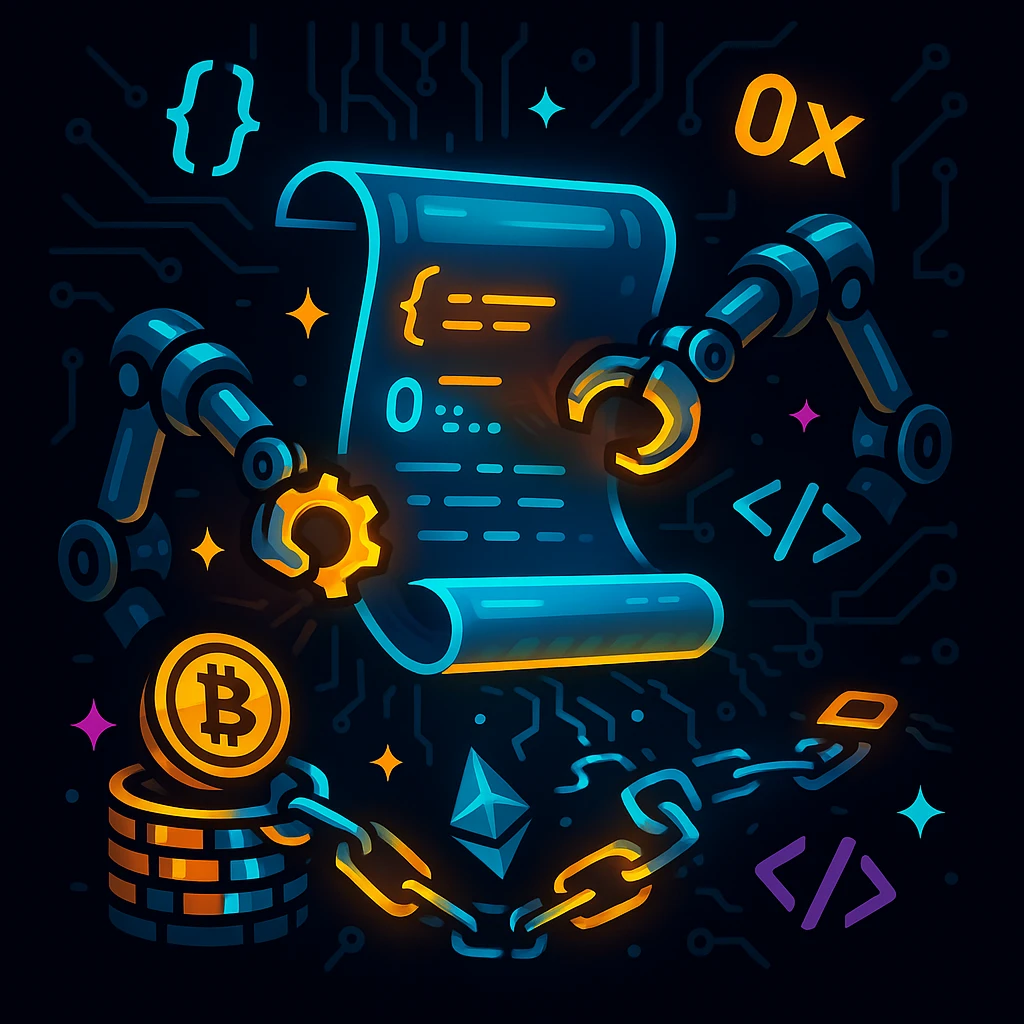Imagine a vending machine: you put in $1, you get a soda — no cashier, no bank, no trust needed. That’s basically a smart contract in crypto. It’s code on a blockchain that runs automatically when conditions are met. Smart contracts are the reason Ethereum, Solana, and other chains exploded. They turn crypto from “digital gold” into a programmable financial system.
What Is a Smart Contract?
A smart contract is a piece of code stored on a blockchain that executes when specific rules are triggered. Once deployed, it runs exactly as written — no one can change it.
Example:
- You send ETH into a DeFi lending contract.
- Code checks your collateral.
- If you meet requirements, you instantly get a loan.
- No bank, no paperwork, just code.
Why Smart Contracts Matter
- Trustless: You don’t need to trust a bank or middleman. Code = law.
- Transparent: Anyone can read the contract on-chain.
- Permissionless: Anyone with a wallet can interact, no gatekeepers.
- Automated: No human approval needed, runs 24/7.
Real-World Uses of Smart Contracts
1. DeFi (Decentralized Finance)
- Uniswap uses contracts to swap tokens automatically.
- Aave uses them for lending and liquidations.
2. NFTs & Gaming
- NFT marketplaces like OpenSea rely on contracts for minting, buying, selling.
- Games like Axie Infinity use them to handle item ownership and battles.
3. DAOs (Decentralized Autonomous Organizations)
- Voting, treasury management, and proposals all run through contracts.
4. Payments & Escrow
- Freelancers get paid automatically when milestones are delivered.
- Escrow contracts protect buyers/sellers in P2P deals.
5. Gambling & Lotteries
- On-chain casinos and prediction markets use contracts to guarantee fairness.
- No shady house — just provable code.
Benefits vs Risks
Benefits:
- Removes middlemen.
- Borderless, fast, transparent.
- Opens finance to anyone with internet.
Risks:
- Bugs: Bad code = hacks. Over $3B stolen from DeFi in 2023 alone.
- Immutability: Once deployed, you can’t “fix” it easily.
- Complexity: Most people don’t read code — they trust audits.
- Scams: Malicious contracts can drain wallets if you sign blindly.
Real-World Example
In 2020, Compound’s smart contracts kicked off the DeFi Summer yield farming boom. Billions flowed in because anyone could lend/borrow without banks. On the flip side, the infamous DAO Hack of 2016 exploited a bug in Ethereum’s first big contract experiment, leading to a $60M theft and even a chain split (Ethereum vs Ethereum Classic).
The Future of Smart Contracts
- Cross-chain: Contracts on different blockchains interacting via bridges (LayerZero, Wormhole).
- RWA integration: Real estate deeds, car titles, and stocks tokenized into contracts.
- AI + smart contracts: Automated agents managing DeFi positions or DAO treasuries.
- Mainstream adoption: Governments and enterprises already experimenting with smart contracts for supply chain and payments.
Final Thoughts: Code Is the New Law
Smart contracts are the beating heart of Web3. They automate money, ownership, and trust in ways traditional systems can’t.
Yes, there are risks. Yes, bugs can nuke projects. But without smart contracts, there is no DeFi, no NFTs, no DAOs, no Web3 gambling.
The future of finance isn’t paperwork or banks — it’s transparent code on-chain. And that code is what makes the degen casino we all love possible. Wagmi. 🚀


